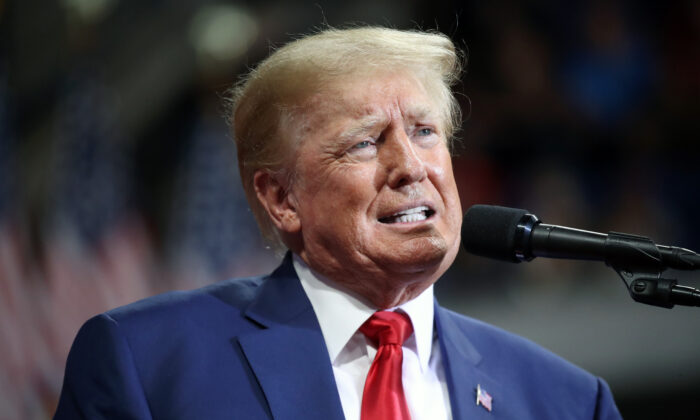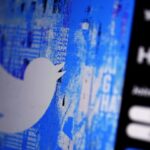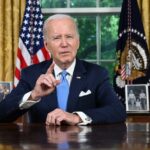By Mimi Nguyen Ly
Internal Twitter documents released by journalists Michael Shellenberger and Leighton Woodhouse late Saturday showed how executives of the social media platform decided to deviate from a longstanding company policy to permanently ban former President Donald Trump.
Yoel Roth, then-Twitter’s head of trust and safety, told a sales executive in a message on Jan. 7, 2021—one day before Trump’s Twitter account was permanently banned—that the company was “changing our public interest approach” for Trump’s account “in this specific case.”
Roth was referring to Twitter’s longstanding “public-interest exceptions” policy, which allows elected officials to post content even if some content violate Twitter rules.
“Twitter generally actions Tweets that violate our rules,” Twitter said on its website in an outline of the policy. “However, we recognize that sometimes it may be in the public interest to allow people to view Tweets that would otherwise be taken down. We consider content to be in the public interest if it directly contributes to understanding or discussion of a matter of public concern.”
It came after the sales executive told Roth: “jack says: ‘we will permanently suspend [Trump] if our policies are violated after a 12 hour account lock’… what policies is jack talking about?” The sales executive was presumably referring to then-Twitter CEO Jack Dorsey.
Roth responded: “*ANY* policy violation”
According to messages shared by Shellenberger and Woodhouse, later that day, a Twitter engineer asked Roth whether there had been “discussion about reshaping the rules around ‘official accounts,’” citing @realDonaldTrump as an example.
“I feel a lot of debates around exceptions stem from the fact that Trump’s account is not technically different from anybody else’ and yet treated differently due to his personal status, without corresponding _Twitter rules_ to clarify the responsibilities that should come with that status,” the engineer continued.
Roth concurred. “I think you’re spot on,” he said. “To put a different spin on it: policy is one part of the system of how Twitter works. There are different things you can change when you want to effect different behaviors. Policy and enforcement are one; the product is another … all of that is situated in a bigger system i.e. the world … When you change one part of the system, you necessarily have to adapt the rest. And I think we ran into the world changing faster than we were able to either adapt the product or the policy. We can and should do both.”
Shellenberger commented that Roth’s response “hints at how Twitter would justify deviating from its longstanding policy.”
Twitter on Jan. 8, 2021, announced a permanent ban on Trump, citing “risk of further incitement of violence.”
Shortly following Trump’s ban, The Epoch Times reached out to Twitter asking whether it had any evidence that Trump’s statements were directly linked to any violence. Twitter did not respond.
The social media platform had on Jan. 6 removed a tweet in which Trump shared a video asking those who were at the U.S. Capitol to leave in peace.
“You have to go home now. We have to have peace. We have to have law and order, we have to respect our great people in law and order,” Trump said in the deleted video.
The permanent ban of Trump conflicted with Twitter’s language outlining its own policies for regulating content from world leaders, Shellenberger noted.
He pointed out that Twitter on Jan. 8 said Trump’s ban is based on “specifically how [Trump’s tweets] are being received & interpreted,” but that the social media giant back in 2019 said it does “not attempt to determine all potential interpretations of the content or its intent.”
Shellenberger said Twitter’s internal communications showed that its leadership had decided to “create justifications to ban Trump,” pursue a change of policy “for Trump alone, distinct from other political leaders,” and that they expressed “no concern for the free speech or democracy implications of a ban.”
Concern From Junior Employee
At least one junior-level employee at Twitter expressed concern over singling Trump out for a permanent ban. Shellenberger said the internal communications were “tucked away in a lower-level Slack channel known as ‘site-integrity-auto.’”
“This might be an unpopular opinion but one off ad hoc decisions like this that don’t appear rooted in policy are imho [in my honest opinion] a slippery slope and reflect an alternatively unequal dictatorial problem,” the employee said.
“This now appears to be a fiat by an online platform CEO with a global presence that can gatekeep speech for the entire world—which seems unsustainable,” they added.
The White House and separately Trump himself had on Jan. 7, 2021, condemned the violence that took place at and around the Capitol building on Jan. 6, 2021.
“Like all Americans, I am outraged by the violence, lawlessness, and mayhem. I immediately deployed the National Guard and federal law enforcement to secure the building and expel the intruders,” Trump said in a video posted to Twitter before his account was permanently suspended. “America is and must always be a nation of law and order. The demonstrators who infiltrated the Capitol have defiled the seat of American democracy.”
“To those who engaged in acts of violence and destruction, you do not represent our country. And to those who broke the law, you will pay.”






